新概念一83-84课学习课件
合集下载
新概念一Lesson 83-84 ppt课件
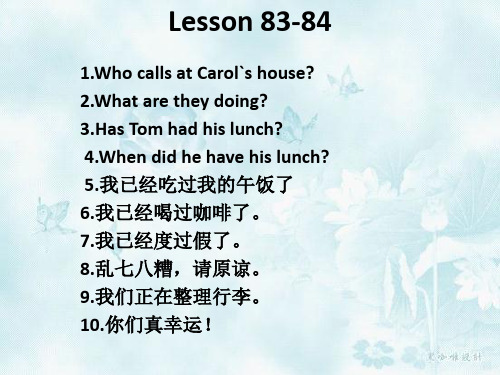
电影
film n.胶卷,底片
Please give me a roll of film. 请给我一卷胶卷。
film v.拍电影
I have filmed . 我拍过电影。
★ beautiful adj.
adj. 美丽的,漂亮的
a beautiful flower 美丽的花 a beautiful woman 美丽的女人
★cinema n.电影院
cinthe cinema tomorrow.(movie theater <美语>电影院) 明天我们打算去电影院。
film n.电影
a film star 电影明星
see the film 看电影
make a film拍
London 伦敦
Tokyo 东京
Washington 华盛顿 Sydney 悉尼
巴黎凯旋门
(Triumphal Arch [trai'Λmfel a:k])
• 凯旋门坐落在巴黎西北面的戴高乐 广场,12条大街以它为中心放射形 散开,因此,戴高乐广场也称星际广 场。 凯旋门的建造,始于古罗马。 1806年2月22日,拿破仑一世在欧斯 代尔利茨战役中打败了奥俄联军, 凯旋回国,经过星际广场,在国民的 欢呼声中,...
Lesson 83-84
1.Who calls at Carol`s house? 2.What are they doing? 3.Has Tom had his lunch? 4.When did he have his lunch? 5.我已经吃过我的午饭了 6.我已经喝过咖啡了。 7.我已经度过假了。 8.乱七八糟,请原谅。 9.我们正在整理行李。 10.你们真幸运!
新概念英语第一册83-84课课件

7/15/2015
Revision
• Grammar 句型 • 句型一 他正在洗澡。 He is having a bath. • 句型二 他在楼上。 He is upstairs. • 句型三 我和山姆一起吃午饭了。 Sam and I had lunch together today. • 句型四 你早饭/午饭/晚饭吃什么了? What did you have for .1. 自找麻烦 rock the boat • 2. 有麻烦 in hot water • 3. 祸从口出 put one's foot in one's mouth
7/15/2015
Revision
• • • • • • • •
• Words and Phrases 单词 • bath 洗澡 • restaurant 饭店,餐馆 • ready 准备好的 • nearly 几乎 • roast 烤的 • holiday 假日 • haircut 理发 • breakfast 早饭
• 萨拉丢掉工作和房子后变得穷困潦 倒。 • Sarah was down and out after losing her job and her apartment.
7/15/2015
• have a bone to pick with 有账要算 我有账跟你算.你还欠我十五美金没还呢 I have a bone to pick with you. You still owe(欠) me the fifteen dollars.
7/15/2015
Revision
我不要打 盹!!!我不 要打盹!!我 不要打 盹!。。。。
7/15/2015
课文导入 Lead In
Revision
• Grammar 句型 • 句型一 他正在洗澡。 He is having a bath. • 句型二 他在楼上。 He is upstairs. • 句型三 我和山姆一起吃午饭了。 Sam and I had lunch together today. • 句型四 你早饭/午饭/晚饭吃什么了? What did you have for .1. 自找麻烦 rock the boat • 2. 有麻烦 in hot water • 3. 祸从口出 put one's foot in one's mouth
7/15/2015
Revision
• • • • • • • •
• Words and Phrases 单词 • bath 洗澡 • restaurant 饭店,餐馆 • ready 准备好的 • nearly 几乎 • roast 烤的 • holiday 假日 • haircut 理发 • breakfast 早饭
• 萨拉丢掉工作和房子后变得穷困潦 倒。 • Sarah was down and out after losing her job and her apartment.
7/15/2015
• have a bone to pick with 有账要算 我有账跟你算.你还欠我十五美金没还呢 I have a bone to pick with you. You still owe(欠) me the fifteen dollars.
7/15/2015
Revision
我不要打 盹!!!我不 要打盹!!我 不要打 盹!。。。。
7/15/2015
课文导入 Lead In
新概念英语第一册Lessons83-84课件
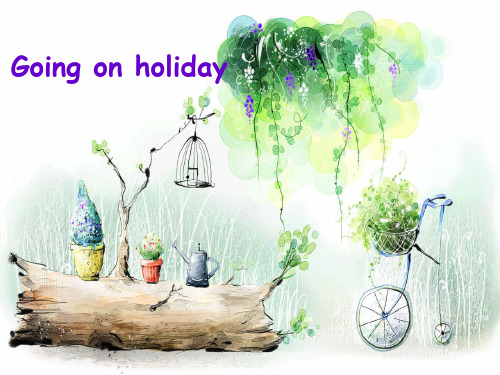
• 每日一笑
Dragon born dragon , chicken born chicken , mouse’s son can make hole !
• 每日一笑
If you want money , I have no.
If you want life , I have one .
at 4 o’clock.
Would you like some ice-creams?
No, thanks. I’ve had an icecream. I had an ice-cream at four o’clock.
I’ve already had some/ one... I haven’t / She hasn’t had any ... Have you had any…?
2021/8/23
(2) n. 背包,行李包
Her pack is cute.
2021/8/23
★ suitcase [ˈsu:tkeɪs] n.手提箱
2021/8/23
★ already [ɔ:lˈredi] adv.已经
I have had lunch already. 我已经吃完午饭了。
2.have lunch with sb. 和某人一起吃午饭
We're having lunch with John today. 我们今天和约翰一起共进午餐。
Have you had…? 你已经...了吗?
Read the 2 stories:
<Ⅰ>
He had a piece of pizza at 5 o’clock. He is full.
I had at half past twelve. CAROL:Have a cup of coffee then. SAM:I've just had a cup, thank you. I had one after my lunch. TOM: Let's go into the living room, Carol.
优选教育新概念英语第一册Lesson83-84(共60张PPT)

2. 谈论过去发生的某事,但对现在造 成了影响
e.g. She has broken her arm, so she can’t play basketball. 她伤了她的胳膊, 所以她不能打篮球 了.
3. 过去开始的某事,现在还在继续.
e.g. He has lived in China for 20 years. 他已经在中国住了20年了. He has lived in China since 1993. 4. 刚刚发生的事情.
<Ⅱ> They had some ice-creams
at 4 o’clock.
Would you like some ice-creams?
No, thanks. I’ve had an ice-cream. I had an ice-cream at four o’clock.
I have had… 我已经吃过/喝过/从事了…
leave-left-left
lose-lost-lost
make-made-made
feel-felt-felt
spell-spelt-spelt
stand-stood-stood
2. 改变单词中间元音字母。
sit-sat-sat
win-won-won
hold-held-held
find-found-found
•
We're going to leave tomorrow.
•
Tom and I are going to have a holiday.
• SAM: Aren't you lucky!
• TOM: When are you going to have a holiday, Sam?
最新新概念英语第一册83-84课课件教学讲义PPT课件

• We’re going to leave tomorrow. • = We’re leaving tomorrow. • 当动词是leave, go, come, arrive等时,
可以用现在进行时表将来。
• I’m coming. • 他今天晚上就到 • He’s arriving tonight.
• 清理散乱的东西 • clear up the mess • He was such a mess that he did not
know what to do. • 他心乱得不知如何是好
★pack v. 包装,打包,装箱 ① v. 打包,装箱
• pack one’s suitcase 打包 • pack one’s suitcases 收拾行李。
• Let’s hold a meeting.
• untidy = messy • tidy-untidy • happy-unhappy • comfortable-uncomfortable • lucky-unlucky • like-unlike • sure-unsure • 单词前加“un”表示否定前缀
现在完成时VS一般过去时
时间最不偏私,给任何人都是二十 四小时;时间也最偏私,给任何人
都不二十四小时(赫胥黎)
勤奋的人是时间 的主人,懒惰的 人是时间的奴隶
清华学霸——马冬晗(姐姐)、马冬昕(妹妹 )
籍贯:中国,辽宁省 出生年月:1989.11 所在院校: 马冬晗(姐姐)清华大学,精仪系81班——
② v. 挤满,塞满 • 大厅里挤满了影迷。
• The movie fans packed the hall. • 公共汽车里挤满了人。
• The bus is packed with people.
新概念英语第一册课件NCE_Lesson83-84(共93页)——shirley

6. 分钟在前的时间的表达法。 前点前用 past 2:10
ten past two 半点用 half past
3:30
half past three 半点后用to 表达“差几分几点(小时+1)”
5:55
five to six
时间表达法:
• [1] 顺读法: • [2] 逆读法:
[1] 顺读法:
n.洗澡 ad.几乎,将近 a.准备好的,完好的 n.正餐,晚餐 n.饭馆,餐馆 a.烤的
n.早饭 n.理发 n.聚会
n.假日
Revision
1. Everyone says a phrase of “have”
2. Answer my questions: ①. Where’s Tom? What’s he doing? ②. What did Sam have? ③. Is dinner ready? ④. What time can they have dinner? ⑤. Where did they have lunch? ⑥. What are they going to have tonight?
★ already adv.已经(现完标志)
1.我已经吃过我的早饭了。 I have already had my breakfast.
already 用于肯定句 yet用于否定句或疑问句,表示还没有。
我还没有吃早饭。 I have not had my breakfast yet.
你吃过早饭了吗? Have you had your breakfast yet ?
suitcase
suitcase n. 手提箱 /’su:tkeis/
bookcase
showcase
ten past two 半点用 half past
3:30
half past three 半点后用to 表达“差几分几点(小时+1)”
5:55
five to six
时间表达法:
• [1] 顺读法: • [2] 逆读法:
[1] 顺读法:
n.洗澡 ad.几乎,将近 a.准备好的,完好的 n.正餐,晚餐 n.饭馆,餐馆 a.烤的
n.早饭 n.理发 n.聚会
n.假日
Revision
1. Everyone says a phrase of “have”
2. Answer my questions: ①. Where’s Tom? What’s he doing? ②. What did Sam have? ③. Is dinner ready? ④. What time can they have dinner? ⑤. Where did they have lunch? ⑥. What are they going to have tonight?
★ already adv.已经(现完标志)
1.我已经吃过我的早饭了。 I have already had my breakfast.
already 用于肯定句 yet用于否定句或疑问句,表示还没有。
我还没有吃早饭。 I have not had my breakfast yet.
你吃过早饭了吗? Have you had your breakfast yet ?
suitcase
suitcase n. 手提箱 /’su:tkeis/
bookcase
showcase
新概念英语第一册83-84-86-85课课件
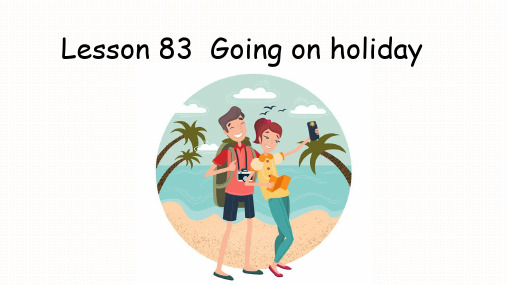
2. How is the film?
It’s old, but it’s very good.
3. What was the weather like in Paris in spring?
It was awful.
Read and act:
I have had some fruit. fruit
bananas
oranges
peaches
apples
vegetables
We have had some vegetables.
lettuce
cabbage
peas
beans
meat
He has had some meat.
beef
lamb
What has she done? She has aired the room.
What has she done? She has aired the room.
What has she done? She has aired the room.
What has she done? She has aired the room.
K: Yes, I have.
G: Wha2t's on?
K: ‘Paris in the Spring'.
G: Oh, I've alre3ady seen it. I sa4w it on television last year.
It's an old film, but it's very good.
Lesson 83 Going on holiday
New words
mess [mes]
It’s old, but it’s very good.
3. What was the weather like in Paris in spring?
It was awful.
Read and act:
I have had some fruit. fruit
bananas
oranges
peaches
apples
vegetables
We have had some vegetables.
lettuce
cabbage
peas
beans
meat
He has had some meat.
beef
lamb
What has she done? She has aired the room.
What has she done? She has aired the room.
What has she done? She has aired the room.
What has she done? She has aired the room.
K: Yes, I have.
G: Wha2t's on?
K: ‘Paris in the Spring'.
G: Oh, I've alre3ady seen it. I sa4w it on television last year.
It's an old film, but it's very good.
Lesson 83 Going on holiday
New words
mess [mes]
新概念英语第一册lesson_83_-84课件新

We can have our coffee there.
杂乱的
CAROL:
Excuse the mess, Sam.
messy杂乱的形容词
This room's very untidy.
We're packing our suitcases.
We're going to leave tomorrow.
找句子
1. 我已经吃过午饭了。 I’ve already had lunch. 2. 我刚才喝过一杯了。 I’ve just had one cup. 3. 我今年已经度过假了。 I’ve already had my hliday this year.
现在完成时
1)用法: • 表示在过去不确定的时间里发生的,并与 现在有着某种的联系(对现在产生影响) • I can go now. I have finished my homework. • 表示开始于过去,并且持续到现在的动作: • I have stayed at home for two days. • 我呆在家里两天了。 关键词:already,yet,just,never,ever,for+时间段, since+时间点
Listen to the Mp3 for the first time and the question :
• Does Sam want to have lunch with Tom and Carol? • No , he doesn’t . • When did Sam have lunch?
开聚会____________
have a holiday 度假 ______________
have a walk have a party 散步_______________
新概念英语第一册83-84课省一等奖课件_图文

2018/8/8
• 8.-Where did you go? -I stayed at home. 一 般现在时(仅仅是谈论过去某时发生的事 )。 • 这里的home是名词,前面用介词at,但不 用加冠词the。 • 而在go home, arrive home中home是地点副 词,所有前面不加介词。
• • • • • • • • •
let’s后面要用动词原形。 let’s 包括对方。例如: Let’s go! Let’s have some tea. let us 不包括对方。例如: Mum, please let us play football. 注意:let’s have some tea, shall we? 我们一起喝茶怎么样? Let us go home, will you? 你回家吧,怎么样?
201d-windy cloud-cloudy sun-sunny Rain-rainy Snow-snowy 在名词的后面+y变为形容词
2018/8/8
• 5.Tom and I are going to have a holiday. • 说两个人的顺序时,一般把别人放在自己之 前,以示尊敬。 • be going to do sth. 一般将来时(表示计划、打 算做某事)。 • have a holiday 度假【回顾】have的用法。 • 6. Aren’t you lucky! 你们可真幸运哪! • 貌似否定疑问句的感叹句。 • 7. I’ve already had my holiday this year. 现在完成 时(画外音:我今年不能再休假了。)
单词学习
• mess /mes/ n. 杂乱,凌乱 • pack/pæ k/ v.包装,打包,装箱 • suitcase/'sju:tkeis/ n. 手提箱 • leave/li:v/ v. 离开 • already/a:l'redi/ adv. 已经
• 8.-Where did you go? -I stayed at home. 一 般现在时(仅仅是谈论过去某时发生的事 )。 • 这里的home是名词,前面用介词at,但不 用加冠词the。 • 而在go home, arrive home中home是地点副 词,所有前面不加介词。
• • • • • • • • •
let’s后面要用动词原形。 let’s 包括对方。例如: Let’s go! Let’s have some tea. let us 不包括对方。例如: Mum, please let us play football. 注意:let’s have some tea, shall we? 我们一起喝茶怎么样? Let us go home, will you? 你回家吧,怎么样?
201d-windy cloud-cloudy sun-sunny Rain-rainy Snow-snowy 在名词的后面+y变为形容词
2018/8/8
• 5.Tom and I are going to have a holiday. • 说两个人的顺序时,一般把别人放在自己之 前,以示尊敬。 • be going to do sth. 一般将来时(表示计划、打 算做某事)。 • have a holiday 度假【回顾】have的用法。 • 6. Aren’t you lucky! 你们可真幸运哪! • 貌似否定疑问句的感叹句。 • 7. I’ve already had my holiday this year. 现在完成 时(画外音:我今年不能再休假了。)
单词学习
• mess /mes/ n. 杂乱,凌乱 • pack/pæ k/ v.包装,打包,装箱 • suitcase/'sju:tkeis/ n. 手提箱 • leave/li:v/ v. 离开 • already/a:l'redi/ adv. 已经
新概念一Lesson83-84 PPT

TEST QUESTIONS
1.我已经浇了8盆花了(Eight potted flower)。 2.他已经做好家庭作业了。 3.我们已经看了10部电影。 4.我已经吃好午饭了。 5.她已经打扫好房间了。
HOLIDAY
Useful words and expressions Transport: bus, car, train, plane, ship, bike, subway Accommodation: hotel, tent, apartment, villa, resort, hostel Scenery: beach, lake, river, sea, seaside, temple, mountain, museum, park, forest,
sell,tell lend,spend,send,build say,pay,lay
-n
-ee-
-nt
-e-ought
-nt
-e-ought
burn,learn,mean
meet,feed bring,buy,fight,think
-aught
-aught
catch,teach
ABB(含规则动词)
Lesson 83 Going on holiday
Where did you go on holiday? I went to Paris.
Where did you go on holiday? I went to London.
• Where are you going to go on holiday? • I am going to go to Japan.
suitcase
mess
untidy
新概念英语第一册lesson_83_-84课件新
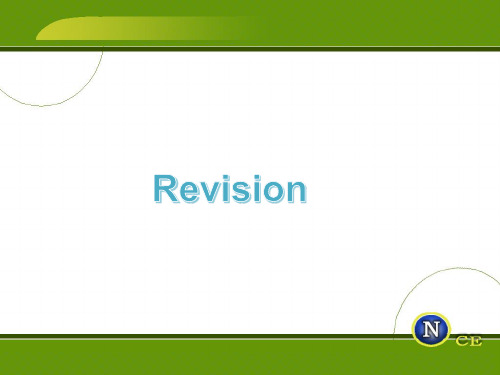
用 have 填空: 洗澡 _h_a_v_e__a_b_a_t_h 游泳 _h_a_v_e__a_s_w__im____ 休息 __h_a_v_e_a__re_s_t 度假 __h_a_v_e_a__h_o_l_id_a_y_
开聚会_h__a_v_e__a__p_a_r_ty 散步___h_a_v__e__a__w__a_l_k
抽一支烟__h_a__v_e__a____ cigatette
喝杯威士忌__h__a_v_e__w__h__is__k_y
Have a dictation
• 1.洗澡(短语) 2 . 几乎,将近
• 3. 准备好的 及短语 4. 吃晚餐
• 5.北京烤鸭
6.
请原谅屋子乱 收拾行李
度假
今年 呆在家里
Come in have lunch at half past twelve have a cup of coffee Let’s go into the living room Excuse the mess pack our suitcases have a holiday this year stay at home
• What are they going to do?
They are going to have a holiday .
• Where did Sam go for his holiday this year?
He stayed at home .
请进
吃午餐 在12点半
来一杯咖啡
让我们
进入客厅
1. in a mess
= at sixes and sevens 乱七八糟的(状态或局面) 你的房间乱七八糟的. Your room _is_i_n_a__m_e_s_s___. 2. What a mess ! 好乱啊!
新概念英语第一册83-84课课件
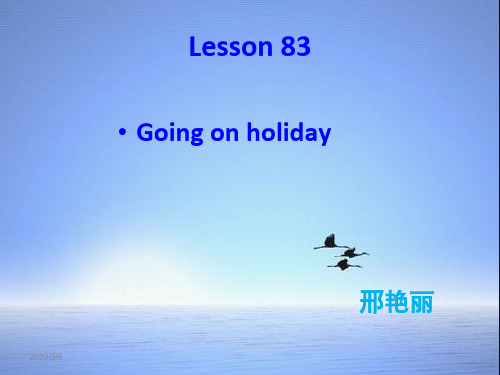
2020/3/9
Listen to the tape again.
• Listen to the tape again. Pay attention to the new words and expressions. Try to remerber the text. Follow it ,please.
I have already had my breakfast. already 用于肯定句 2.yet用于否定句或疑问句,表示还没有。 我还没有吃早饭。
I have not had my breakfast yet. 你吃过早饭了吗?
Have you had your breakfast yet ?
完成课后84课课后练习 • 4.听写第83课,错词5111 • 5.总结现在完成时用法与一般过去时的用法
Daily English
No pains no gains.
不劳无获。
2020/3/9
• 3. • untidy = messy • tidy-untidy • happy-unhappy • comfortable-uncomfortable • lucky-unlucky • sure-unsure • fair-unfair • 单词前加“un”表示否定前缀
• wind-windy • cloud-cloudy • sun-sunny • Rain-rainy • Snow-snowy • 在名词的后面+y变为形容词
时(画外音:我今年不能再休假了。)
2020/3/9
• 8.-Where did you go? -I stayed at home. 一 般现在时(仅仅是谈论过去某时发生的事 )。
• 这里的home是名词,前面用介词at,但不 用加冠词the。
Listen to the tape again.
• Listen to the tape again. Pay attention to the new words and expressions. Try to remerber the text. Follow it ,please.
I have already had my breakfast. already 用于肯定句 2.yet用于否定句或疑问句,表示还没有。 我还没有吃早饭。
I have not had my breakfast yet. 你吃过早饭了吗?
Have you had your breakfast yet ?
完成课后84课课后练习 • 4.听写第83课,错词5111 • 5.总结现在完成时用法与一般过去时的用法
Daily English
No pains no gains.
不劳无获。
2020/3/9
• 3. • untidy = messy • tidy-untidy • happy-unhappy • comfortable-uncomfortable • lucky-unlucky • sure-unsure • fair-unfair • 单词前加“un”表示否定前缀
• wind-windy • cloud-cloudy • sun-sunny • Rain-rainy • Snow-snowy • 在名词的后面+y变为形容词
时(画外音:我今年不能再休假了。)
2020/3/9
• 8.-Where did you go? -I stayed at home. 一 般现在时(仅仅是谈论过去某时发生的事 )。
• 这里的home是名词,前面用介词at,但不 用加冠词the。
- 1、下载文档前请自行甄别文档内容的完整性,平台不提供额外的编辑、内容补充、找答案等附加服务。
- 2、"仅部分预览"的文档,不可在线预览部分如存在完整性等问题,可反馈申请退款(可完整预览的文档不适用该条件!)。
- 3、如文档侵犯您的权益,请联系客服反馈,我们会尽快为您处理(人工客服工作时间:9:00-18:30)。
课文详解〗 〖新概念第一册83-84 课文详解〗 新概念第一册 课文详注 Further notes on the text 1.Come in. 进来吧。 进来吧。 . Have a cup of tea then. Let's go into the living-room, Carol. - 句都是祈使句。 这3句都是祈使句。表示请求或命令的句子叫祈使 句都是祈使句 祈使句中主语you常不出现,谓语动词用原 常不出现, 句。祈使句中主语 常不出现 句末用感叹号或句号。读时用降调。 形,句末用感叹号或句号。读时用降调。 2.I've just had a cup. 我刚喝了一杯。 . 我刚喝了一杯。 句中 cup后省略了 of coffee。 后省略了 。 3.We're going to leave tomorrow. . 表示“ 准备” 这里的 are going to表示“打算”、“准备”。 表示 打算”
Excuse the mess, Sam. This room's very untidy. We're packing our suitcases. We're going to leave tomorrow. Tom and I are going to have a holiday. Aren't you lucky! When are you going to have a holiday, Sam? I don't know. I've already had my holiday this year. Where did you go? I stayed at home!
词汇学习 Word study
1. leave v. .
词汇学习 Word study
(3)留给,遗留;委托: )留给,遗留;委托: The famous actress left all her money to charity. 这位著名的女演员将她所有的钱都遗留给了慈善 机构。 机构。 ‘Leave it to me, ’he said. “这事交给我来办吧,”他说道。 这事交给我来办吧, 他说道。 这事交给我来办吧
语法 Grammar in use
现在完成时 (3)现在完成时由 have/has+ 过去分词构成, ) / 过去分词构成, 人称用has,其他人称皆用 单数第 3人称用 人称用 ,其他人称皆用have。规则 。 动词的过去分词与过去式相同, 动词的过去分词与过去式相同,而不规则动词的 过去分词则无统一的规律可言,需特别加以记忆。 过去分词则无统一的规律可言,需特别加以记忆。 (4)一般现在完成时通常与表示不确定的时间副 ) 词或短语连用如 just, already, before, never, ever, twice, three times等。 等
1. leave v. . (1)离开,出发: )离开,出发: The train is going to leave in 5 minutes. 火车将于5分钟后开出 分钟后开出。 火车将于 分钟后开出。 I'm going to leave Italy. 我准备离开意大利。 我准备离开意大利。 (2)舍弃;脱离: )舍弃;脱离: John's wife left him . 约翰的妻子舍他而去。 约翰的妻子舍他而去。 Alexander is leaving the company after 30 years' service. 亚历山大将在为公司服务了30年之后离开公司 年之后离开公司。 亚历山大将在为公司服务了 年之后离开公司。
语法 Grammar in use
现在完成时 (1)在英语中,现在完成时主要用于以下两种情 )在英语中, 况:或者表示在过去不确定的时间里发生的并与 现在有着某种联系的动作; 现在有着某种联系的动作;或者表示开始于过去 并持续到现在的动作。 并持续到现在的动作。 (2)现在完成时在汉语中常用“了”、“过”或 )现在完成时在汉语中常用“ 已经”来表示。 “已经”来表示。
2.pack v. . (1)打包,装箱: )打包,装箱: We are leaving tomorrow and I haven't even started packing yet. 我们明天就要走了, 我们明天就要走了,而我甚至还没开始将行李打 包呢。 包呢。 Don' t forget to pack the mirror! 别忘了把镜 子装起来! 子装起来! (2)挤满,塞满: )挤满,塞满: The movie fans packed the hall. 大厅里挤满 了影迷。 了影迷。 The bus was packed with people. 公共汽车 里挤满了人
Hello, e in. Hi, Sam. We're having lunch. Do you want to have lunch with us? No, thank you. Tom. I've already had lunch. I had lunch at half past twelve. Have a cup of coffee then. I've just had a cup, thank you. I had one after my lunch. Let's go into the living room,Carol. We can have o
